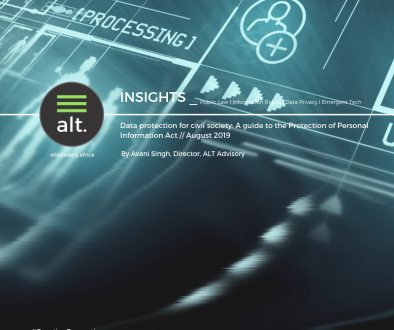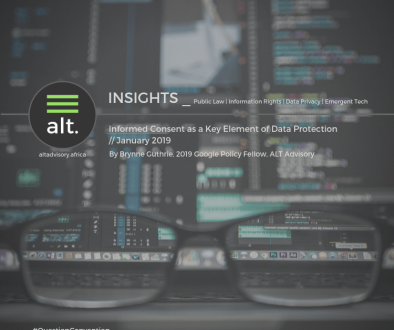Disabling Human Rights Online: The Implications of Internet Shutdowns in Africa
Internet shutdowns in Africa violate international law and limit the growth of Africa’s digital economy.
Summary: There have been 22 documented internet shutdowns in thirteen African states since 2016. The most notable shutdown occurred in Cameroon in January 2017 and lasted 93 days. Internet shutdowns are generally disproportionate and indiscriminate in their nature and directly violate the rights to freedom of expression, freedom of association and peaceful assembly, and access to information. Indirectly, internet shutdowns may violate the rights to free and fair elections, education, healthcare, equality, trade, and to enjoy the benefit of scientific progress, including technology. The implications on access to essential services and basic resources are also severe, as are the economic consequences on Africa’s digital economy. States need to ensure that any regulations or agreements with internet service providers, either state-controlled or independent, regarding internet shutdowns are publicly available and any order or instruction to initiate an internet shutdown must be in compliance with law, and subject to administrative and judicial review.
Increasingly, African states are using internet shutdowns to limit dissenting voices and the free flow of information, and, in doing so, violate the rule of law and threaten economic stability. While there is currently no overarching multi-stakeholder research on internet shutdowns, Access Now’s Shutdown Tracker Optimization Project (STOP) documented 55 internet shutdowns in 2016 and 61 internet shutdowns in the first three quarters of 2017. Of the documented 116 internet shutdowns since 2016, 22 occurred in Africa.
“An internet shutdown is an intentional disruption of internet or electronic communications, rendering them inaccessible or effectively unusable, for a specific population or within a location, often to exert control over the flow of information.”
Ethiopia (4), the seat of the African Union, and Egypt (3) top the Africa list, followed by the Democratic Republic of Congo (2), Morocco (2), Algeria (2), Uganda (2), Chad (1), Togo (1), Gambia (1), Libya (1), Mali (1), Gabon (1) and Cameroon (1). Notably, it is reported that Cameroon shutdown the internet for 93 days in the first quarter of 2017.
All thirteen states, with the exception of Morocco who recently re-joined the African Union, have ratified the African Charter on Human and Peoples’ Rights (ACHPR), legally obliging them to protect and promote the rights to freedom of expression, freedom of peaceful assembly, and the right to access information. All thirteen states have ratified the International Covenant on Civil and Political Rights (ICCPR), one of the cornerstones of international human rights law.
In the rapidly developing digital age, these states intentionally violate binding international law and their own domestic constitutions, seemingly unwilling to accept the recent resolution of the United Nations Human Rights Council in 2016 that “the same rights that people have offline must also be protected online”, particularly in relation to freedom of expression. The same resolution states further that it “[c]ondemns unequivocally measures to intentionally prevent or disrupt access to or dissemination of information online in violation of international human rights law and calls on all States to refrain from and cease such measures”.
In this regard, and by way of an example, the act of confiscating anti-government pamphlets or hard-copy publications is no different to preventing access to anti‑government posts on WhatsApp or Facebook by way of an internet shutdown. While the content of the messages in the pamphlet or post may be robust, critical, or annoying to the government concerned, both means of distribution of the message are central to the exercise of the right to freedom of expression, an internationally protected human right. And increasingly, expression takes place online – unable to thrive if subject to internet shutdowns.
What is an internet shutdown?
While there is no commonly agreed definition, STOP, part of Access Now’s #KeepItOn Campaign, defines an internet shutdown as “an intentional disruption of internet or electronic communications, rendering them inaccessible or effectively unusable, for a specific population or within a location, often to exert control over the flow of information.”

In essence, an internet shutdown, otherwise known as a “blackout” or “kill switch”, includes total and localised internet shutdowns, bandwidth throttling, and service-based blocking of two-way communication platforms (such as WhatsApp and social media networks). The primary means through which an internet shutdown occurs is through internet service providers (ISPs) disabling service. The ability of a state, through its security services or national communications regulators, to order an internet shutdown is largely dependent on considerations such as the applicable laws in place, the licensing conditions, and the complicity of the ISPs in this practice – some which may be state‑owned.
“While shutdowns are frequently associated with total network outages, they may also arise when access to mobile communications, websites or social media and messaging applications is blocked, throttled or rendered “effectively unusable”. Shutdowns may affect towns or regions within a country, an entire country or even multiple countries and may last for periods ranging from hours to months.” (United Nations Special Rapporteur on freedom of opinion and expression, David Kaye.)
Internet shutdowns should be distinguished from various forms of internet restrictions or censorships, such as limiting or restricting access to websites continuing hate speech and limiting access to websites containing violence or nudity for children. Internet shutdowns are generally indiscriminate in their nature, equally limiting, for instance, the ability of a protest organiser to facilitate an assembly or a student trying to e-mail an assignment to a lecturer.
Legal and political implications
Legally, an internet shutdown, without a legislative or judicial process compliant with the requirements to limit rights, may constitute a direct violation of, among others, the right to freedom of expression, freedom of association and peaceful assembly, and the right to access information. Indirectly, an internet shutdown may violate the rights to free and fair elections, education, healthcare, equality, trade, and to enjoy the benefit of scientific progress, including technology.
In terms of the ICCPR, in order to limit a right, any limitation must be prescribed by law; seek to achieve a legitimate aim; and the limitation must be necessary to the prescribed purpose. It is difficult to understand how an indiscriminate internet shutdown meets the requirement of seeking to achieve a legitimate aim and is necessary for a prescribed purpose. The effect of the shutdown is simply too broad and disproportionate: possibly legitimately restricting violent protest or terrorist activity but equally preventing vendors from receiving mobile money or placing electronic orders with suppliers.
In a localised sense, internet shutdowns still fall foul of the legitimacy requirement in that their effect is arbitrary, and they may constitute a disproportional use of force against people in a local. Less restrictive measures, such as targeted surveillance (provided that it is sanctioned by law and subject to administrative review) or traditional policing intelligence (either physical or online) remain capable of dealing with threats to national security or public order.
Politically, internet shutdowns may prevent opposition political parties from engaging their support base, unable to access state-controlled means of communication. In election times, commonly when internet shutdowns are initiated, they have the effect of limiting the free flow of political thought or ideology and prevent voters from freely considering and exercising their vote. Most importantly, limiting the free flow of information may allow a government to evade accountability through a restriction of media or civil society oversight, and diminish participatory processes between a state and its people.
Social and economic implications
Africa, also known as the “mobile” continent, is becoming increasingly reliant on the internet and mobile communications for economic and social development. Africa’s digital economy will reportedly increase twelve-fold in the next five years. As more people in Africa are able to afford smart-devices, and with constant improvements to mobile connectivity, essential services, businesses, and individuals are becoming increasingly reliant on internet access, either through fixed or mobile connections.
A recent report by CIPESA finds that internet shutdowns have cost sub-Saharan Africa around $237m since 2015. The Brookings Institute reported in 2016 that the internet shutdowns in Ethiopia and the Democratic Republic of Congo cost the economies of those countries $8m and $72m, respectively. CIPESA reported that a combined loss of $132m has resulted from Ethiopia’s internet shutdowns since 2015, the highest documented loss in Africa.
The social impacts of internet shutdowns, particularly in relation to attempts to alleviate poverty are clear. Restricting access to the internet, an enabler of economic and social upliftment, has dire consequences for individuals who are seeking to change their circumstances.
Looking forward
The internet enables the exercise of a variety of human rights, assists with social and political development, and is becoming increasingly central to economic development. While it is arguable that international law is yet to expressly recognise a self-standing right to the internet, the internet is pivotal to current human development, including access to essential services and basic resources.
States need to ensure that any regulations or agreements with ISPs, state-controlled or independent, regarding internet shutdowns are publicly available and any order or instruction to initiate an internet shutdown must be in compliance with law, and subject to administrative and judicial review. Importantly, internet governance structures within states should include members of business, civil society organisations, and independent experts to avoid state abuse. And states, working with ISPs and business, should seek lasting solutions to ensure internet access in order to promote human rights and economic development.
Ultimately, states who initiate internet shutdowns, without following due process, are guilty of violating international law. In these cases, condemnation from all concerned, including regional and international mechanisms, should be swift.
Michael Power is a Director and Co-founder of ALT Advisory.
Useful resources
- Access Now’s #KeepItOn Campaign
- CIPESA, A Framework for Calculating the Economic Impact of Internet Disruptions in Sub-Saharan Africa (2017)
- CIPESA, State of Internet Freedom in Africa 2017: Intermediaries’ Role in Advancing Internet Freedom – Challenges and Prospects (2017)
- United Nations Human Rights Council, Report of the Special Rapporteur on the promotion and protection of the right to freedom of opinion and expression (2017)




